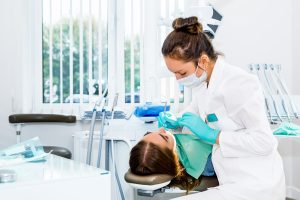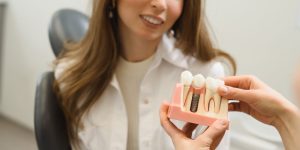

Complete Your Smile
If you’re among the millions grappling with missing teeth, you’re probably wondering what to do next. After all, is a replacement really necessary? The truth is that opting not to replace your missing teeth could lead to many health complications, from bone loss to impaired digestion.
Your teeth aren’t just for show; they’re a vital part of your oral anatomy. Our Staten Island dentists will help you understand the importance of replacing missing teeth and explore the myriad options you have at hand.
The Importance of Replacing Missing Teeth
When it comes to missing teeth, it’s essential to understand the importance of replacing them.
- One aspect of tooth replacement is the impact it has on our ability to enjoy a wide range of foods. Missing teeth often make eating difficult and limit the foods that can be consumed. For example, biting into an apple or enjoying crunchy snacks may become challenging with gaps in your smile.
- Each tooth in our mouth plays a crucial role in supporting the surrounding teeth. When one tooth is missing, the adjacent teeth may start to tilt towards the open space, leading to crooked teeth that are harder to clean properly. This misalignment can pave the way for tartar buildup, gum disease, and other oral health complications.
- Another critical factor related to tooth replacement is jawbone health. The loss of a tooth can result in jawbone deterioration over time, which may eventually lead to facial collapse and an appearance of premature aging. Dental implants act as natural tooth roots, providing stimulation to maintain healthy jawbone tissue.
- Missing teeth can also affect your ability to pronounce words correctly. Teeth play a significant role in forming sounds during speech. Replacing missing teeth with suitable tooth replacement options can realign your bite, improve your ability to speak comfortably, and help enunciate words.
- Missing teeth can have a significant impact on your smile and overall facial aesthetics. The gaps left by missing teeth can cause your face to sag or appear sunken, making you look older than you are.
- When a tooth is lost and not replaced, it can lead to a range of long-term oral health issues. With a missing tooth, the neighboring teeth may start to shift and tilt into the open space over time. This can result in crooked teeth, which are harder to clean properly and increase the risk of cavities and gum disease. Additionally, when teeth shift, it can affect the alignment of your bite, leading to problems with jaw joint disorders or temporomandibular joint (TMJ) pain.
 Tooth Replacement Options
Tooth Replacement Options
When it comes to replacing missing teeth, there are several dental treatment options available that can help restore your smile and prevent further complications. The choice depends on various factors such as the number of missing teeth, their location, oral health condition, budget considerations, and personal preferences.
- Dental Implants: Dental implants are considered one of the most reliable and long-lasting solutions for replacing missing teeth. They involve the surgical placement of a titanium post into the jawbone, which acts as an artificial tooth root. Once the implant fuses with the bone, a crown or prosthetic tooth is placed on top, providing a natural-looking and functional replacement.
- Dental Bridges: A dental bridge consists of one or more artificial teeth supported by adjacent healthy teeth or dental implants. The pontic (replacement tooth) is anchored to these neighboring teeth, effectively bridging the gap left by the missing tooth or teeth.
- Removable Dentures: Removable dentures are a traditional option for replacing multiple missing teeth. These prosthetic devices can be easily taken out and put back into place.
Evaluating Dental Procedures
It’s crucial to consult with your dentist to thoroughly evaluate which option is best suited for your specific needs and oral health conditions. Remember, each person’s situation is unique, requiring careful consideration before making a decision.
Your dentist will take into account factors such as the number of missing teeth, jawbone health, aesthetic concerns, and financial considerations to guide you toward the most suitable dental procedure.
Dental Implants
Dental implants are highly regarded as a long-term solution. Dental implants function as artificial tooth roots that are surgically implanted into the jawbone. They provide excellent stability and strength for replacement teeth, mimicking the appearance and function of natural teeth. Dental implants offer many benefits, such as improved chewing efficiency, enhanced speech clarity, and preventing bone loss in the jaw.
For example, imagine you have missing teeth that hinder your ability to enjoy certain foods or make you feel self-conscious about speaking clearly. Dental implants can restore your confidence and ability to enjoy a wide range of foods without limitations. They provide a permanent solution that integrates seamlessly with your natural teeth.
 Dentures
Dentures
Dentures are removable replacements for missing teeth that come in both full and partial sets. Full dentures are used when all teeth on an arch are missing, while partial dentures replace only a few missing teeth. Dentures can be an appealing choice due to their relative affordability and versatility.
However, dentures may require adjustments over time due to changes in gum tissue and bone structure. While they offer functional benefits for eating and speaking, some individuals may find them less stable compared to other options like dental implants.
Dental Bridges
Dental bridges present another alternative for replacing missing teeth. A dental bridge consists of a false tooth (pontic) anchored between two crowns placed on the neighboring natural teeth or implant-supported crowns. Bridges can be an effective way to restore your smile when multiple adjacent teeth are missing.
Schedule Your Consultation
Do you live in the Staten Island area? Contact our top-rated dentists today to schedule your consultation and determine what tooth replacement is best for you. Call our dental office today at (718) 948-5111 to get started.


 Tooth Replacement Options
Tooth Replacement Options Dentures
Dentures